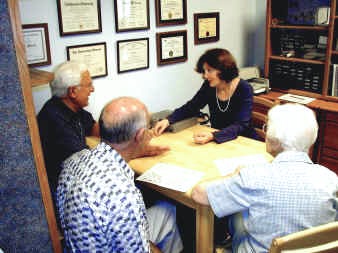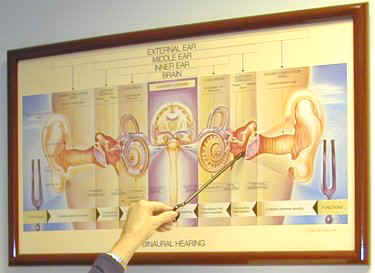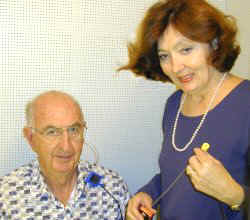Often
people lose their hearing so gradually they don't realize it's happening.
|

Michele Wilson, Ph.D. explaining answers to
hearing loss.
|

|
Do you have a hearing loss? |
|
Do you....
-
Frequently ask people to repeat themselves?
-
Often feel tired or stressed during conversations?
-
Avoid social situations?
-
Find yourself frequently denying hearing problems?
-
Often misunderstand conversations?
-
Turn up the volume on your TV so loud that others complain?
-
Have difficulty understanding speech in noisy places?
Everyone experiences these problems from time to time. If you experience them consistently, however, you probably have a hearing loss. You're in good company.
More than 24 million Americans
-- one in ten -- experience hearing loss. Nearly one-half of these are under the age of
65.
Hearing loss often occurs so gradually that the person with the hearing loss doesn't even notice -- but others do.
Children and teenagers seldom complain about the
symptoms of hearing loss, and adults may lose their hearing so gradually that
they don't realize it's happening. The first step in treatment of a hearing
problem is a hearing evaluation by an audiologist.
|

| All
right, I might have a hearing loss. Now what? |
See an audiologist to have your hearing evaluated. No one is too young
or too old to have a hearing test. Audiologists are well-prepared to give you your hearing evaluation. They have an advanced university education (master's or doctorate) in Audiology, professional credentials and are licensed in nearly every state. They will provide the full range of tests to determine the exact nature of your hearing loss, and whether your condition warrants the attention of a physician. Many audiologists also dispense hearing aids.
If you are located in Southern California, Michele
Wilson, Ph.D., will be your audiologist of choice.
|

|
Types of hearing loss |
| |
|

Schematic of the auditory system
-
A sensorineural hearing loss occurs when there is damage to the inner ear (cochlea) or hearing nerve. This is typically a permanent type of hearing loss that usually can be helped with a hearing aid.
- A conductive hearing loss occurs when sound is not conducted efficiently through the ear canal, car drum or middle ear. This is often reversible with medical or surgical intervention. If surgery is not recommended, hearing aids may be appropriate.
- A mixed hearing loss occurs when someone has a combination of a sensorineural hearing loss and a conductive hearing loss.
|

|
Why do I have a hearing loss? |
Possible causes of hearing loss include:
- Deterioration of the hearing system due to the normal aging process. This problem be helped with hearing aids. Your audiologist can provide important help regarding the selection of appropriate hearing aids and rehabilitation.
- Damage to the hearing system due to serious illness, medications, and heredity or family hearing loss. Although these factors usually result in permanent, sensorineural hearing loss, it is important to have both the audiologist and a physician involved in the diagnosis. If medical treatment is not indicated, your audiologist can help with special types of hearing aids appropriate for the hearing loss.
- Problems such as ear infections, injury,
ear disease or excessive ear wax. These often can be treated medically or surgically. Your audiologist will evaluate your hearing and refer you to a physician for treatment.
- Damage to the hearing system
due to prolonged exposure to loud noise. Prevention of hearing loss is the key! Your audiologist can provide you with appropriate ear protection to prevent further decrease in hearing as well as hearing aids and assistive listening devices, if indicated.
|

|
Why an audiologist for hearing aids? |
| |
 Most people with hearing loss can benefit greatly from hearing aids. Your audiologist can advise you if they are recommended for your hearing loss. Hearing aids alone may not be an instant
answer to your hearing problems. They should be a part of a program of hearing rehabilitation that includes complete testing,
counseling, instruction and follow-up. Most people with hearing loss can benefit greatly from hearing aids. Your audiologist can advise you if they are recommended for your hearing loss. Hearing aids alone may not be an instant
answer to your hearing problems. They should be a part of a program of hearing rehabilitation that includes complete testing,
counseling, instruction and follow-up.
Today's hearing aids are much more complex (and potentially useful) than in the past. They are designed to closely match a person's hearing loss. To use them correctly requires a complete
understanding of that loss. Such diagnosis is a specialty of audiologists.
Audiologists also specialize in counseling and rehabilitation. Expert counseling -- before and after you obtain hearing aids -- is vital to your success with hearing aids, as it takes time to
adjust to amplification. Furthermore, there are many ways to improve the effectiveness of hearing aids. By choosing an audiologist as your hearing aid
provider, you can work with the
same expert for testing, fitting, and hearing rehabilitation guidance.
|

|
Audiologists -- your hearing care providers |
| |
An audiologist has a graduate degree, has completed a clinical internship, has passed a comprehensive national standardized examination and has professional credentials. Most states also have licensure for audiologists. These credentials will help you identify the most qualified person to provide your hearing care services. There are over 10,000 audiologists in the United States who provide hearing care services, including:
- Comprehensive hearing evaluations for persons of all ages.
- Selection, fitting and dispensing of hearing aids and other assistive devices.
- Patient and family counseling about living with hearing loss.
- Hearing conservation programs to prevent hearing loss.
- Research and development of new evaluation techniques and rehabilitation strategies.
Remember! Hearing loss may occur so gradually that the person is not aware that it is happening. The first step in identification of hearing loss is a comprehensive hearing evaluation by an
audiologist. If you live in Southern California, Michele
Wilson, Ph.D., should be your audiologist.
|
|